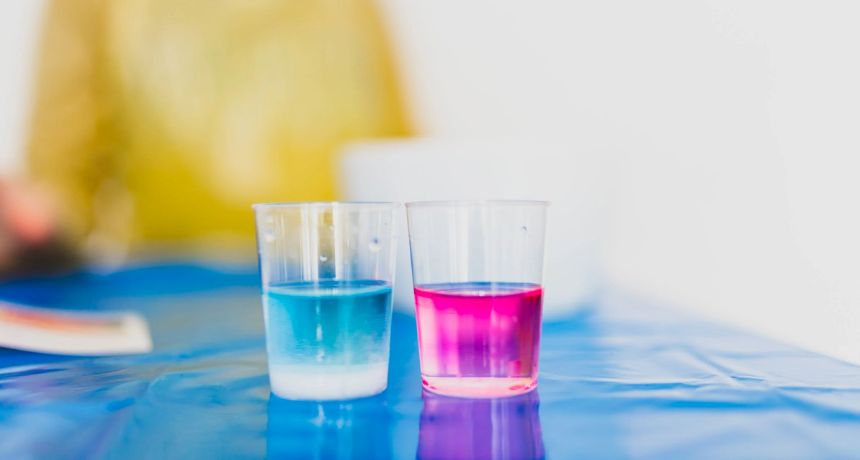Why You Should Invest in Good Testing Kits For Lead Water
Lead is a dangerous heavy metal that, when taken in high amounts, can have major negative effects on health, especially in young children and pregnant women. Unfortunately, lead in drinking water continues to be a major problem in many nations, including the United States. Your water may taste and appear great, but it does not guarantee that it is lead-free.
To check for lead in your water on a regular basis, use a dependable lead water test kit. In this article, we’ll examine some of the top lead water supply test kits now on the market, ranking them according to characteristics like accuracy, usability, cost, and others.
After reading this post, you ought to know more about the best lead water test kit for your requirements and price range.
Reviews – Best Lead Water Test Kits 2024
Tap Score Essential City Water Test – Top Choice For Municipal Water
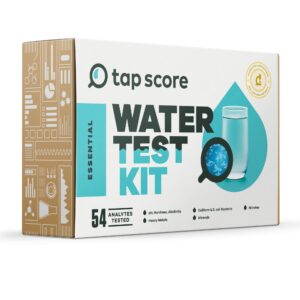
Lead and other heavy metals are tested for in your water using the Tap Score Essential City Water Test, a very dependable and accurate water testing tool. It is among the top lead water supply test kits on the market right now. The kit is made to test city water, which is frequently chemically treated and has high lead levels.
The Tap Score Essential City Water Test is user-friendly and prompt with findings. Clear and comprehensive instructions on how to get the water sample and send it to the lab for examination are included with the water test kit. After the lab receives the sample, the test results are normally given electronically within 10 days.
Lead, copper, arsenic, fluoride, and chlorine are just a few of the many variables that the Tap Score Essential City Water Test examines. Furthermore, it conducts tests for additional pollutants such pesticides, herbicides, and industrial chemicals. The test also yields data on total dissolved solids, water hardness, and pH levels.
The customer service offered by the Tap Score Essential City Water Test is one of its most notable aspects. The business offers individualized guidance on how to understand the findings and makes suggestions on how to handle any problems with the water.
This includes making suggestions for filters, water treatment systems, and other ways to deal with any toxins discovered in the water.
Overall, anyone wishing to test their water for lead and other heavy elements should strongly consider the Tap Score Essential City Water Test. The test is simple to use, produces thorough results, and has top-notch customer service.
Pros:
- Comprehensive testing: The Tap Score Essential City Water Test covers a wide range of contaminants beyond just lead, including other heavy metals, disinfection byproducts, and more.
- Customized recommendations: Based on your specific results, Tap Score provides recommendations for water treatment options to address any issues found in your water.
- Easy-to-understand results: Tap Score provides a detailed report of your test results in plain language, making it easy for consumers to understand.
- Lab-certified: Tap Score uses a lab certified by the Environmental Protection Agency (EPA) to analyze their water samples, which adds to the accuracy and reliability of the results.
Cons:
- Cost: The Tap Score Essential City Water Test is one of the more expensive water testing options on the market, which may make it prohibitive for some consumers.
- Wait time for results: Since Tap Score sends samples to a lab for analysis, there is a wait time of a few weeks to receive results.
- Limited sampling locations: While Tap Score does offer free shipping to customers, the sampling locations for the test are currently limited to the United States and Canada.
- Limited number of tests: The Tap Score Essential City Water Test is designed to test the water from one location, which may not be ideal for consumers who want to test multiple locations or their entire home.
Tap Score Essential Well Water Test – Great For Wells
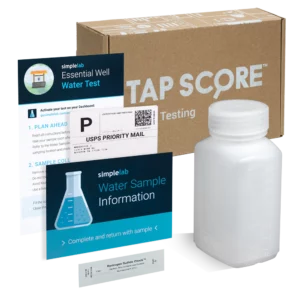
A thorough water testing kit called Tap Score Essential Well Water Test offers precise information on the quality of your well water, including whether or not lead is present.
The kit is intended for those who use well water exclusively for drinking, cooking, and bathing. It is the best choice for anyone who wish to test their water for toxins like lead and make sure it is safe to drink.
The Tap Score Essential Well Water Test’s simplicity of use is one of its main advantages. Users may easily collect water samples from their well and send them to the lab for testing thanks to the kit’s comprehensive instructions.
Additionally, the kit comes with all the tools required to collect samples, such as bottles, labels, and a pre-paid postage label for sending the samples to the lab.
The Tap Score Essential Well Water Test provides a thorough examination of the water samples and checks for a variety of contaminants, including lead, arsenic, nitrate, bacteria, and other dangerous compounds.
The test findings are presented in an understandable style and include thorough details about the quantities of pollutants found in the water. A thorough evaluation of the water quality is also provided, along with suggestions for potential water treatment options.
The accuracy of the Tap Score Essential Well Water Test is one of its main benefits. Modern testing facilities use cutting-edge technology to deliver precise and accurate findings for the exam.
The Environmental Protection Agency (EPA) and the National Environmental Laboratory Accreditation Program (NELAP) have certified the lab, ensuring the validity and accuracy of the findings.
The price of the Tap Score Essential Well Water Test is another benefit. The kit is an affordable alternative for consumers who wish to test their well water for lead and other toxins because it is priced competitively in comparison to other water testing kits available on the market.
The Tap Score Essential Well Water Test’s only possible drawback is that it may take several days to acquire the test results. This can be problematic for those who need solutions right away or who have an urgent water quality concern.
Overall, those who want to test their well water for pollutants like lead and other heavy metals should strongly consider the Tap Score Essential Well Water Test. It is simple to use, reasonably priced, and delivers trustworthy results.
It is a useful instrument for making sure that your well water is safe to use because it provides advice for treatment options as well as a thorough examination of the water quality.
Pros:
- The Tap Score Essential Well Water Test is comprehensive and checks for a wide range of contaminants, including lead, arsenic, nitrate, coliform bacteria, and more.
- The test results are easy to understand and come with clear recommendations for how to address any issues found in the water.
- The test kit is easy to use, with clear instructions provided, and no need to send samples to a lab.
- The company provides excellent customer service, with representatives available to answer questions and provide guidance.
- The price of the Tap Score Essential Well Water Test is reasonable compared to other comprehensive well water test kits on the market.
Cons:
- As with any at-home water test kit, there is always the potential for user error or inaccuracies in the results.
- The Tap Score Essential Well Water Test does not include testing for some contaminants, such as PFAS (per- and polyfluoroalkyl substances) and some pesticides, which may be a concern for some well owners.
- While the test kit is relatively easy to use, some users may still find the process of collecting and preparing water samples to be a bit time-consuming and complex.
- The test kit is designed specifically for well water and may not be as effective for testing other sources of water, such as surface water or municipal water supplies.
Tap Score Specialized Lead and Copper Water Test
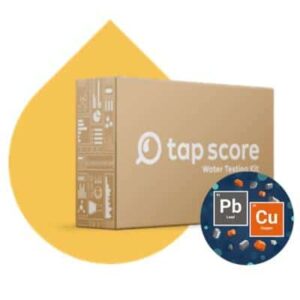
Users can evaluate the concentrations of lead and copper in their water with the Tap Score Specialized Lead and Copper Water Test, a thorough water testing kit. This test kit is a great option for people who want to make sure that their drinking water is safe from lead because it gives accurate results and is simple to use.
The Tap Score Specialized Lead and Copper Water Test kit includes a sample bottle, a comprehensive instruction booklet, and a pre-paid return shipping label, as well as everything customers need to take a water sample.
Users can simply return their water sample back to the Tap Score lab in the provided packaging after they have collected it. Users will get access to a thorough report that includes an explanation of their results and suggestions for any necessary action after receiving their results through email within 5–10 business days.
The accuracy of the Tap Score Specialized Lead and Copper Water Test is one of its most notable qualities. The laboratory measures the concentrations of lead and copper in the water sample using cutting-edge technology, guaranteeing accurate results.
Additionally, the information offered to customers is thorough and straightforward to comprehend, making it easy for users to decide whether or not their water is safe to drink.
Convenience is another advantage of the Tap Score Specialized Lead and Copper Water Test. Users do not need to travel to a testing center because they may collect their water sample at home and just ship it back to the lab. The test is also reasonably priced, making it a great choice for those on a tight budget who still want to check the safety of their drinking water.
It is crucial to keep in mind that the Tap Score Specialized Lead and Copper Water Test was created exclusively to measure the levels of lead and copper in water. Other possible pollutants, such as coliform bacteria or pesticides, are not tested for.
Additionally, as the test is intended to be used with municipal water supplies, it might not be appropriate for people who have private wells.
For determining the concentrations of lead and copper in drinking water, the Tap Score Specialized Lead and Copper Water Test is a trustworthy and practical water testing kit. It is a great option for people who wish to guarantee the safety of their drinking water because it gives reliable results, a thorough report, and is reasonably priced.
The test, which is intended exclusively for lead and copper, may not be appropriate for people with private wells or those who want to test for additional contaminants, so it’s crucial to keep that in mind.
Pros:
- Provides accurate and reliable results for lead and copper levels in water
- Water test kit includes detailed instructions and prepaid shipping for easy sample collection and return
- Results are available online within 5 business days and include recommendations for addressing any issues found
- Drinking water test kit also screens for other contaminants, such as arsenic and fluoride
- Good customer service and support available to answer any questions or concerns
Cons:
- The specialized lead and copper test is more expensive than other Tap Score test kits
- The test is not as comprehensive as some other lead water testing kits, which may also screen for other heavy metals and contaminants
- The results may not be as detailed as those provided by a professional lab analysis
- Requires some effort on the part of the user to collect and send in the water sample, and to interpret the results and take appropriate action if necessary.
National Testing Laboratories Water Test Kit
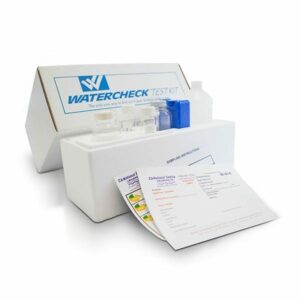
If you want to test your water for lead pollution, the National Testing Laboratories Water Test Kit is a thorough and trustworthy solution. The kit includes a sterile sample bottle, comprehensive instructions, and a pre-paid postage label.
You can use it to collect and submit a water sample to a lab for examination. The company offers a thorough report with clear explanations of the test results, and the results are normally ready in 10 business days.
National Testing Laboratories places a high focus on accuracy, and the business uses cutting-edge machinery and qualified personnel to make sure that its outcomes are trustworthy.
Along with other typical pollutants including germs, pesticides, and chlorine, the kit also tests for lead. Customers can also add testing for additional contaminants that may be unique to their area or concerns to their kit.
The National Testing Laboratories Water Test Kit is more expensive than many other home testing kits available, which is a drawback. For those who seek the most reliable findings available, the company’s extensive testing and professional analysis make it a reasonable purchase.
Pros:
- Comprehensive testing for lead and other contaminants
- Expert analysis and easy-to-understand report
- Customizable options for additional testing
- Reliable results from state-of-the-art equipment and trained technicians
Cons:
- Higher cost compared to other home testing kits
Safe Home DIY City Water Test Kit – Excellent DIY Choice
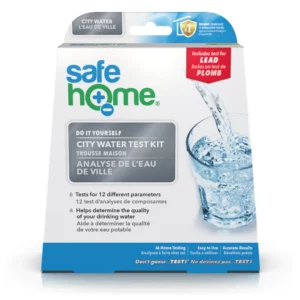
For individuals wishing to test their drinking water for lead and other toxins, the Safe Home DIY City Water Test Kit is a dependable and cost-effective DIY choice. This kit is a thorough alternative for people worried about the quality of their water because it is made to test for a range of pollutants, such as lead, chlorine, and coliform bacteria.
The simplicity of usage of this kit is one of its primary characteristics. The test results may be obtained quickly and easily with the provided test strips, and the directions are clear and simple to understand. The process is made simple and hassle-free by the inclusion of a pre-paid envelope with the kit for mailing the samples to the lab.
The Safe Home DIY City Water Test Kit examines for bacteria, nitrate, chlorine, and other common pollutants in addition to lead. Because of this, it is a flexible choice for anyone who want to test their water for a variety of potential problems.
Four distinct tests, each created to look for a particular group of pollutants, are included in the kit. These tests consist of a chlorine test, a nitrate/nitrite test, a lead test, and a bacteria test. Each test is simple to apply and comes with comprehensive instructions, so even novice users may easily obtain reliable results.
The fact that the findings are not always as obvious as they could be is a potential drawback of this kit. It can be tricky to identify the precise quantity of contamination present in the water because the test strips can be challenging to read and the color changes can be minor.
The kit does, however, provide a thorough interpretation guide that can aid consumers in better understanding their water quality.
In general, the Safe Home DIY City Water Test Kit is a good option for anyone who want to check their drinking water for pollutants like lead. It is reasonably priced, simple to use, and offers a wide array of tests for many hazardous contaminants.
The supplied instruction to interpreting the results can assist users in making judgments about the safety of their drinking water, even though the results may not always be crystal clear.
Pros:
- Easy to use and comes with clear instructions
- Comprehensive testing for a range of common contaminants
- Affordable option for those on a budget
- Includes prepaid envelope for mailing samples to the lab
Cons:
- Results can be difficult to read and interpret
- Color changes on the test strips can be subtle and hard to distinguish
Who Should Read This Guide?
Testing kits for lead in water The Buyer’s Guide is designed for people who want to choose from a range of alternatives to find lead in their well or city water. This guide is perfect for those who are willing to pay at least $20–$30 on a test, with a preference for spending more than $100. It includes DIY testing kits and private laboratory testing.
Tests that cost around $130 are the most reliable and capable for individuals with a flexible budget. By evaluating only well-known and respected goods from producers with a long history of happy customers, we hope to help individuals looking to invest in a dependable and useful lead test.
Lead Water Testing Kits Buyer’s Guide
Growing health concerns about lead in drinking water include the possibility of major health issues, especially for young children and expectant women. Lead water testing kits have grown in popularity as a result, allowing households to check their own water supply for lead and other toxins.
However, selecting the best gear for your needs might be overwhelming given the large range of products on the market. In this Buyer’s Guide for Lead Water Testing Kits, we’ll give you all the details you need to make an informed choice, including things to think about, test kinds to choose from, and our top picks for the finest lead water testing kits available.
How to Detect Lead in Water?
Lead can be present in drinking water due to several reasons such as old pipes, solder, and fixtures. Here are some ways to detect lead in water:
- Get a water test: The most reliable way to detect lead in water is by getting a water test from a certified laboratory. You can contact your local health department to find out about certified testing laboratories in your area.
- Use a home testing kit: Home testing kits are widely available and easy to use. They work by changing color when they detect lead in water. However, their accuracy can vary, and they are not always reliable.
- Look for warning signs: If you notice changes in the taste, smell, or appearance of your water, it could be an indication of lead contamination. Also, if you live in an older house with lead pipes or solder, it is more likely that your water contains lead.
- Get your water tested regularly: Even if your water has tested negative for lead in the past, it is essential to get it tested regularly. Lead levels can change over time, so it’s important to be vigilant.
Best Ways to Test Water for Lead
There are several ways to test water for lead, each with its own advantages and disadvantages. Here are some of the best ways to test water for lead:
DIY test kits: An inexpensive method of testing water for lead is to use a DIY test kit. These kits are simple to use and usually just need a few minutes. These kits are frequently less than $30 and are generally accessible online and in hardware stores.
These kits typically use a color-changing strip or solution to detect the presence of lead in water. However, they may not be as accurate as other methods and may not detect low levels of lead.
A DIY drinking water test kit comes with everything you need to conduct the test at home, including a color chart, test strips, and instructions. The test is easy to perform: just fill a glass with water and briefly submerge a test strip in it. To assess the amount of lead in the water, wait until the test strip changes color and then compare it to the color chart.
Professional laboratory tests: Laboratory testing is the most dependable way for obtaining the most accurate assessment of lead in tap water. Numerous lead testing options are available from accredited laboratories, including standalone lead tests and lead testing-inclusive packages.
The duty is removed off your shoulders when you decide to have a private laboratory test your water. Your water sample will be professionally analyzed in a lab after being sent there, and depending on how quickly the facility processes samples, you will receive the results in a few days to a few weeks.
The fastest laboratories deliver results in a week. These tests can detect very low levels of lead and can identify the source of contamination. However, they can be expensive, with prices ranging from around $100 to $500 or more.
Home water testing devices: Similar to DIY test kits, home water testing equipment is more advanced and capable of providing more specific information about the water quality. These tools may offer real-time water quality monitoring and can test for several pollutants, including lead. However, they might need to be professionally installed and can be pricey.
Public water system testing: Regular lead testing and distribution of the results to users are requirements for public water systems. Customers can receive a copy of the most recent test results by contacting their local water authority. These outcomes, however, could not accurately represent the water quality for a particular site, like a residence or place of business.
No matter which method you choose, it’s important to test your water for lead on a regular basis, especially if you have an older home or live in an area with known lead contamination.
DIY Kits or Lab Testing: Which is Better?
Due to its superior accuracy, we strongly advise utilizing a certified lab testing kit for lead instead than a DIY kit. DIY kits only estimate the amount of lead in the water because you have to quickly compare the test strip to a color chart, which might result in hurried and inaccurate testing.
Additionally, incorrect water lead test kit storage can taint the outcomes and produce erroneous readings.
A trustworthy test that offers a thorough examination of the lead concentration in your water is required, even if lab testing can cost more than DIY kits. Compared to tests performed with at-home kits, lab testing procedures are substantially more involved.
Use a send-away test kit to lab test your tap water if you have any reason to believe it contains lead. This will give you peace of mind. Start with a DIY kit if you’re unsure whether the water you drink contains lead. If lead is found, run additional lab tests to verify the findings.
Factors to Consider When Buying a Water Lead Test Kit
An excellent place to start if you’re worried about lead in your drinking water is by getting a water lead test kit. There are a number of crucial elements to take into account before making a purchase to make sure you acquire the best water quality test kit for your requirements.
Type of Water Source
It’s crucial to take the source of your water into account while choosing the best water test kits. Selecting the appropriate water quality test kit is crucial because the water source may give you an idea of what the water contains.
Most manufacturers offer testing kits that are designed specifically for testing applications such well water tests, city water tests, pool water tests, and aquarium tests to make things simpler.
The first thing to consider is the source of your water. Do you get your water from a private well or a public water system? Some testing kits are specifically designed for well water while others are designed for city water. Make sure to choose a lead test kit that is appropriate for your water source.
You may obtain the most precise and complete results by selecting the proper test for your water source. A well water test kit may be the best choice if you have well water because it may find lead and other impurities like iron, bacteria, hardness, and other heavy metals.
If you have municipal water, you can test it for lead and other contaminants like chlorine, other heavy metals, and pesticides with a city water test kit.
Type of Contaminant
If you’re looking for a lead test kit, you probably have some concerns regarding the purity of your water. Even while you might just be interested in testing for lead, it’s vital to remember that many of the most economical testing kits available test for a variety of pollutants.
Lead isn’t the only contaminant that can be found in water. Some testing kits are designed to detect multiple contaminants while others are specifically designed for lead. It’s crucial to take into account additional typical drinking water contaminants that can worry you, such as bacteria, volatile organic compounds, chlorine, fluoride, and other heavy metals.
It’s important to choose a lead test kit that is designed to detect the contaminants you’re concerned about. Look for testing kits that can identify these chemicals in addition to lead when you are purchasing them. Prioritize the contaminants that bother you the most because you might not be able to find a test that can identify them all.
Testing Method
There are two main types of testing kits: DIY test strips and lab testing kits.
Although inexpensive and quick to get findings, DIY testing kits fall short of laboratory testing in terms of detail and accuracy. However, laboratory testing is more expensive than do-it-yourself testing and can detect a larger spectrum of pollutants.
Prior to selecting a lead testing kit for your drinking water, it’s crucial to consider the advantages and disadvantages of both choices. Although laboratory testing is frequently regarded as the most accurate option, not everyone can afford it. DIY test strips can be a more sensible option if cost is an issue or if the results don’t need to be extremely accurate.
Turnaround Time
The type of lead test kit you choose will affect how quickly the results are delivered.
If you need findings quickly, DIY lead test kits can provide results in a matter of minutes. It’s crucial to remember that these kits might not offer the best level of accuracy.
It is advised to conduct further lab testing if your DIY test reveals lead is present. Even though laboratory testing could take longer to produce results, it’s crucial to put accuracy first when working with a chemical like lead that could be dangerous. Some send-away kits offer results in as little as five days, but the majority of labs can deliver results in three weeks.
Certification
It’s important to choose a lead test kit that has been certified by a reputable organization such as the Environmental Protection Agency (EPA). Certification ensures that the test kit meets certain standards for accuracy and reliability.
Cost
Test kits can range in price from less than $20 to over $100. Consider your budget and how much you’re willing to spend on a lead test kit.
Ease of Use
Make sure to choose a test kit that is easy to use and comes with clear instructions. This will ensure that you get accurate results.
Number of Tests
Some testing kits only provide one test while others provide multiple tests. If you have multiple sources of water to test, choose a test kit that provides enough tests to cover all of them.
How We Chose the Top Rated Lead Water Test Kits?
We took into account three primary reasons while choosing the lead testing kits for this guide: testing accuracy, consumer feedback, and overall value for money. Since a lead water test kit is useless if the results are inaccurate, accuracy was a key consideration. To quickly spot any inconsistencies in our lead testing, we always used the same water sample.
While some people would be interested in knowing the precise lead level in their water, others could be fine with an approximation. As a result, this list includes alternatives for both home testing and laboratory testing. However, since we believe lead is too harmful to estimate its level roughly, laboratory testing were given priority.
Another crucial element was client feedback, which offered information about the manufacturer’s general user experience and customer service as well as the testing accuracy. We checked numerous reviews to make sure that customers regularly complimented and strongly suggested the highlighted water lead testing kits.
When choosing the water lead test kits for this guide, price was not as important to us as value for money was.
To decide whether the test kit was worth the money, we looked at aspects including turnaround time, accuracy, quality, and manufacturer’s customer service. Even though several of the water lead test kits on this list are pricey, they deliver accurate, trustworthy findings, offering good value for money.
How We Tested The Best Lead Water Testing Kits
We acknowledge that the only way to fully comprehend a product’s performance in actual circumstances is to test it ourselves. In order to create this manual, we rigorously tested a number of lead water testing kits.
We tested each kit on this list, assessing each one’s usability, distinguishing qualities, and result precision. The overall capabilities of each test kit were then determined by combining our observations with customer feedback and other pertinent data, such as adherence to industry standards.
Frequently Asked Questions
What is a lead water test kit?
A lead water test kit is a device that allows you to test your water for the presence of lead. It typically includes test strips or other materials that you can use to collect a water sample and analyze it for lead.
How do lead water test kits work?
Most lead water test kits use a chemical reaction to detect the presence of lead in water. The test strips or other materials are coated with a reagent that changes color in the presence of lead. You simply dip the test strip into your water sample and wait for the color to change to determine if there is lead present.
Are lead water test kits accurate?
The accuracy of lead water supply test kits can vary depending on the brand and type of kit you choose. DIY lead test kits are generally less accurate than laboratory test kits. However, even laboratory tests can produce false negatives or false positives if not used properly.
How do I choose the right lead water test kit?
When choosing a lead water test kit, consider your budget, your water source (city water or well water), and the types of contaminants you are concerned about. Look for a kit that is easy to use and provides accurate results. Also, check the customer reviews and make sure the kit is certified by an industry organization like NSF International.
What should I do if my lead water test comes back positive?
If your lead water test comes back positive, it is important to take action to protect your health. Contact your local health department for guidance on how to reduce your exposure to lead in water. You may also want to consider installing a water filtration system or replacing your pipes if they contain lead.
Is it necessary to test my water for lead?
Yes, it is important to test your water for lead, especially if you live in an older home or in an area with known lead contamination. Lead can cause serious health issues, especially in children and pregnant women.
How often should I test my water for lead?
It is recommended to test your water for lead at least once every three years, or if there are changes in your water source, plumbing, or if you notice any changes in the color, taste, or odor of your water.
